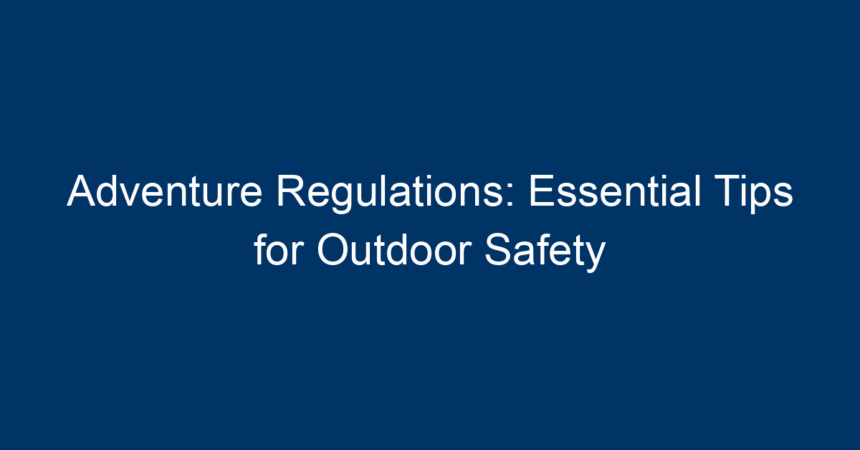Embarking on an outdoor adventure is one of the most exhilarating experiences one can have. The fresh air, breathtaking landscapes, and the thrill of the unknown ignite a sense of freedom and exploration. However, this excitement comes with its own set of responsibilities, particularly concerning safety. Understanding and adhering to adventure regulations is paramount for ensuring a safe and enjoyable experience. In this article, we delve into the essential tips and regulations that every adventurer should consider before setting out, from hiking and camping to rock climbing and kayaking.
Understanding Adventure Regulations
Adventure regulations encompass a set of rules and guidelines designed to protect not only you but also the environment and wildlife during your outdoor pursuits. These regulations vary by region and activity but share the common goal of promoting safety and sustainability. Familiarizing yourself with these laws can prevent accidents, preserve natural habitats, and ensure a positive experience for everyone involved.
The Importance of Outdoor Safety
Safety in outdoor activities cannot be overstated. According to the National Outdoor Leadership School (NOLS), many outdoor accidents stem from a lack of preparation and knowledge of safety regulations. Adventure regulations play a crucial role in:
- Preventing Accidents: Adhering to regulations helps mitigate risks associated with various outdoor activities.
- Conserving Nature: Guidelines often include environmental protection measures, which promote the sustainability of outdoor areas.
- Educating the Public: Regulations provide essential information that can improve your outdoor skills and understanding.
Common Adventure Regulations to Know
1. Permits and Reservations
Before heading out, check if your adventure requires permits—particularly in national parks or protected areas. Some activities, like backcountry camping or rock climbing in specific zones, may necessitate reservations. Permits not only help in managing the number of visitors but also ensure that you’re aware of the specific regulations and safety measures pertaining to the area.
2. Leave No Trace Principles
The Leave No Trace (LNT) principles are paramount in outdoor ethics and are essential components of adventure regulations. These principles encourage outdoor enthusiasts to minimize their impact on the environment. Key LNT principles include:
- Plan Ahead and Prepare: Research your destination, bring the right gear, and check weather conditions.
- Travel and Camp on Durable Surfaces: Stick to established trails and campsites to protect fragile ecosystems.
- Dispose of Waste Properly: Pack out what you bring in, including food scraps and personal items.
3. Wildlife Safety
When venturing into nature, you will likely encounter wildlife. Understanding how to behave around animals can prevent dangerous situations and ensure their protection. Key wildlife safety guidelines include:
- Keep a Safe Distance: Observe animals from a distance to avoid stressing them or provoking an attack.
- Store Food Properly: In bear country, always hang food or use bear canisters to deter wildlife.
4. Weather Awareness
Weather can be unpredictable and potentially dangerous in outdoor settings. Always check forecasts before your adventure, paying close attention to warnings. Key weather safety practices include:
- Understanding Local Weather Patterns: Familiarize yourself with how conditions can change in your area.
- Carrying Appropriate Gear: Ensure you have supplies for both warm and cold conditions, such as rain gear and extra layers.
Preparing for Your Adventure: Gear and Training
The Right Gear
Adventure regulations typically recommend specific gear for various activities. Proper gear enhances safety and can make the experience more enjoyable. Basic gear recommendations include:
- Maps and Navigation Tools: Even if you have a GPS, carrying a physical map and compass is wise.
- First Aid Kit: A well-stocked first aid kit can be a lifesaver in emergencies.
- Emergency Communication Device: Consider taking a satellite phone or personal locator beacon (PLB) when venturing into remote areas.
Professional Training
For more technical adventures, such as rock climbing, whitewater rafting, or backcountry skiing, obtaining professional training is recommended. Courses offered by organizations such as the American Mountain Guides Association (AMGA) and the American Canoe Association (ACA) can enhance your skills and understanding of relevant regulations.
Adventure Regulations by Activity
Different activities will have more specific regulations. Here’s a brief breakdown:
Hiking
- Stay on Marked Trails: This helps to preserve vegetation and reduces erosion.
- Check for Trail Closures: Wildlife migrations or environmental conditions may close certain paths.
Camping
- Campsite Limits: Many regions have regulations regarding how close you can camp to a water source or the number of campsites in an area.
- Fires: Always check if campfires are allowed. In many areas, they are prohibited during high fire risk.
Climbing
- Gear Regulations: Some climbing areas may require specific gear checks or registrations.
- Restricted Routes: Pay attention to seasonal route closures for nesting birds or other ecological concerns.
Conclusion: Embrace Adventure Responsibly
Outdoor adventures can offer incredible freedom, but they come with the responsibility of ensuring safety and environmental stewardship. Understanding and adhering to adventure regulations is a crucial part of any outdoor activity. By being informed, prepared, and respectful of nature and its laws, you not only safeguard your own experience but also ensure that these beautiful landscapes will be preserved for future generations to enjoy.
Actionable Insights
-
Research: Before each adventure, dedicate time to researching regulations specific to your destination and activity.
-
Prepare: Invest in quality gear that meets the needs of your chosen activity, and consider taking a skills workshop.
- Adopt Leave No Trace Practices: Make it a habit to minimize your impact while enjoying the outdoors.
By adopting these practices, you’ll enhance not only your outdoor safety but also the health of our planet. Adventure responsibly, and happy exploring!




